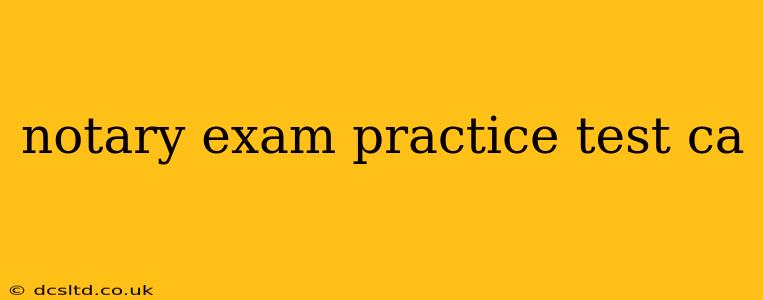Becoming a notary public in California is a rewarding opportunity, but passing the exam is the first hurdle. This comprehensive guide provides a practice test and valuable tips to help you confidently navigate the California notary exam. We'll cover key areas, address common questions, and equip you with the knowledge to succeed. Remember, this practice test is for informational purposes only and should be supplemented with official study materials provided by the California Secretary of State.
What's Covered on the California Notary Exam?
The California notary exam tests your knowledge of the laws and regulations governing notaries public in the state. Key areas include:
- Notary duties and responsibilities: Understanding your role, limitations, and ethical obligations.
- California Notary Public Law: Knowledge of specific sections within the law that govern your actions.
- Journal requirements: Accurate record-keeping and maintenance of your notary journal.
- Wills and trusts: Understanding the limitations of notarizing wills and trusts.
- Acknowledgment and jurat certifications: Knowing the differences and when to use each.
- Fees and prohibited acts: Understanding permissible fees and actions that are prohibited for notaries.
- Seal and signature requirements: Correctly affixing your seal and signature to documents.
- Handling of sensitive information: Maintaining confidentiality and security of documents and personal information.
California Notary Exam Practice Test Questions
Now, let's put your knowledge to the test with some sample questions. Remember to consult your official study materials for the most accurate and up-to-date information.
1. A notary public in California can:
a) Give legal advice to signers. b) Witness signatures only in the presence of other witnesses. c) Administer oaths and affirmations. d) Prepare legal documents for clients.
2. What is the primary purpose of a notary journal?
a) To record personal appointments. b) To track notary fees received. c) To provide a record of notarizations performed. d) To store copies of notarized documents.
3. What is an acknowledgment?
a) A sworn statement made before a notary. b) A declaration of a signer's identity and the voluntary nature of their signature. c) A written verification of the signer's signature by the notary. d) A certificate confirming the authenticity of a document.
4. A notary must refuse to notarize a document if:
a) The signer is a relative. b) The signer is unable to provide identification. c) The signer is visibly intoxicated. d) All of the above.
5. Which of the following is a prohibited act for a California Notary Public?
a) Charging excessive fees. b) Refusing to notarize a document without a valid reason. c) Maintaining a current and accurate notary journal. d) Both a and b.
Answer Key:
- c) Administer oaths and affirmations.
- c) To provide a record of notarizations performed.
- b) A declaration of a signer's identity and the voluntary nature of their signature.
- d) All of the above.
- d) Both a and b.
Frequently Asked Questions (FAQs) about the California Notary Exam
Here are some frequently asked questions to further prepare you for the exam.
How long is the California Notary Exam?
The exam usually takes around 60 minutes to complete.
How many questions are on the California Notary Exam?
There are typically 25 multiple-choice questions.
What types of identification are acceptable for the exam?
Bring a government-issued photo ID, such as a driver’s license or passport.
Where can I find official study materials for the California Notary Exam?
The California Secretary of State's website is the best resource for official study materials, practice questions, and information about the exam process.
What is the passing score on the California Notary Exam?
You need to answer a certain percentage of the questions correctly to pass; this percentage is typically specified in the official materials.
What happens if I fail the California Notary Exam?
You can retake the exam after a waiting period. Information about retake procedures will be available on the California Secretary of State's website.
By diligently reviewing the official study materials, understanding your responsibilities, and practicing with sample questions, you will greatly increase your chances of success on the California notary exam. Good luck!
